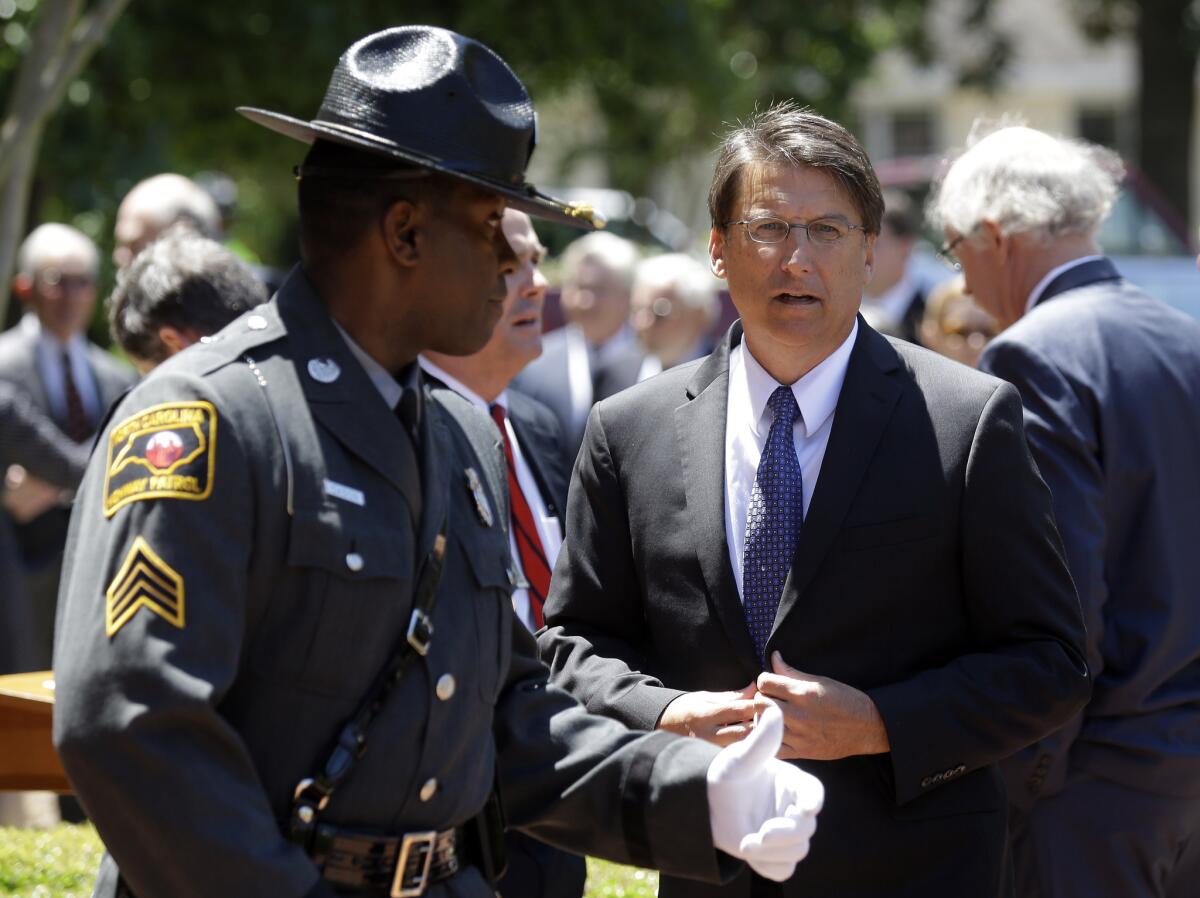North Carolina faces ACLU, NAACP lawsuits over new voter ID law

- Share via
DURHAM, N.C. -- Two lawsuits filed in federal court in North Carolina have challenged the state’s new voter ID law, claiming that some of its provisions infringe on voter rights and discriminate against minorities.
The suits were filed late Monday in U.S. District Court in Greensboro, N.C., by the American Civil Liberties Union and the National Assn. for the Advancement of Colored People.
The new law, signed Monday by Gov. Pat McCrory, requires voters to show government-issued ID cards. It also shortens early voting by a week; ends same-day registration; increases the number of poll observers who can challenge a voter’s eligibility, and eliminates popular preregistration initiatives for high school students.
The law ends straight-ticket voting as well, the practice of voting for every candidate of a single party, which had been in effect in North Carolina since 1925.
The law allows groups to spend unlimited amounts of money for candidates from May to September in certain years, and does not require disclosing the source or amount. It prohibits lobbyists from passing campaign contributions to candidates.
The law also drops requirements that outside groups identify their largest donors, and raises the maximum contribution limit from $4,000 to $5,000.
The ACLU suit, filed on behalf of four North Carolina advocacy groups, alleges that some provisions in the law violate the equal protection clause of the Constitution and the Voting Rights Act of 1965.
“This law is a blatant attempt to make it harder for and dissuade many North Carolinians from registering and casting a ballot,” Chris Brook, legal director of the ACLU of North Carolina Legal Foundation, said in a statement.
The NAACP suit, filed with the Advancement Project and on behalf of a 92-year-old African American woman, also alleges that provisions of the law violate the Constitution and the Voting Rights Act.
“This is the worst voter suppression law in the country,” Penda Hair, co-director of the Advancement Project, a civil rights group, said in a statement.
McCrory’s office has challenged characterizations of the law as one of the nation’s most restrictive. The governor said the law is designed to secure the integrity of voting and adds North Carolina to a majority of states that have passed similar laws.
In a statement, the governor’s office said 34 states now require or will soon require some form of voter ID. North Carolina is one of 37 states that do not allow same-day registration, one of 36 that do not allow straight-ticket voting, and one of 43 that do not allow underage students to preregister, the statement said.
The North Carolina law, while cutting early voting by a week, requires the same number of hours of early voting as during the 2012 election.
“The need for photo ID has been questioned by those who say voter fraud is not a problem in North Carolina,” McCrory said in a statement. “However, without the higher level of identification a photograph provides, is it possible to know?”
He added: “Just because you haven’t been robbed doesn’t mean you shouldn’t lock your doors at night.”
The photo ID provision of the law goes into effect in 2016.
McCrory’s office cited polls showing strong support among state residents for requiring a photo ID to vote. But Democrats and civil rights groups have countered with polls showing strong public objections to shortening early voting periods or eliminating straight-ticket voting.
Opponents of the law have said it is an attempt to restrict voting by groups that tend to vote for Democrats -- such as African Americans, the poor and young people.
In the 2012 election, more than 70% of African American voters voted early. Democrats made up more than 60% of early voters.
One state study estimated that at least 318,000 registered North Carolina voters do not have driver’s licenses or state-issued ID cards. Many are African American, low income or elderly.
Blacks represented 22% of North Carolina’s registered voters in 2012 but accounted for 34% of voters without driver’s licenses, according to Democracy North Carolina, a liberal advocacy group. It says blacks in 2012 made up 29% of North Carolina’s early voters and 34% of same-day registration voters.
The state’s Republican-led legislature introduced the voter ID bill after the U.S. Supreme Court struck down a section of the Voting Rights Law in June. That section had required nine states and parts of several other states, including North Carolina, to get Justice Department approval for changes in voting procedures.
Atty. Gen. Eric H. Holder Jr., who has challenged a voter ID law in Texas, has said the Justice Department may also file suit against similar laws in other states, including North Carolina.
U.S. Rep. G.K. Butterfield (D-N.C.) asked Holder to “take swift and decisive action by using any legal mechanisms” to prevent restrictions on voting rights.
ALSO:
Bloomberg blasts ruling against NYPD’s stop-and-frisks
North Carolina governor signs sweeping voter ID bill into law
Tennessee judge, citing Jesus, changes baby’s name from “Messiah”
Twitter: @davidzucchino
More to Read
Sign up for Essential California
The most important California stories and recommendations in your inbox every morning.
You may occasionally receive promotional content from the Los Angeles Times.











